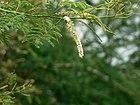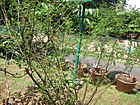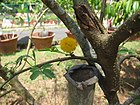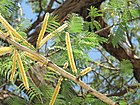Note: This is a project under development. The articles on this wiki are just being initiated and broadly incomplete. You can Help creating new pages.
Difference between revisions of "Acacia catechu"
(→External Links) |
|||
| (8 intermediate revisions by the same user not shown) | |||
| Line 9: | Line 9: | ||
==Chemical Composition== | ==Chemical Composition== | ||
| − | <ref name="chemical composition"/> | + | It contains the following constituents Protocatechuic acid, Taxifolin, Epicatechin, Epigallocatechin, Catechin, Epicatechin gallate, Procyanidin, Phloroglucin, Aldobiuronic acid, Gallic acid, D-galactose, Afzelchin gum, L-arabinose, D-rhamnose, and Quercetin<ref name="chemical composition"/> |
==Common names== | ==Common names== | ||
| Line 19: | Line 19: | ||
===Rasa=== | ===Rasa=== | ||
| − | + | Kashaya, Tikta | |
===Guna=== | ===Guna=== | ||
| − | + | Laghu, Ruksha | |
===Veerya=== | ===Veerya=== | ||
| − | + | Sheeta | |
===Vipaka=== | ===Vipaka=== | ||
| − | + | Katu | |
===Karma=== | ===Karma=== | ||
| Line 31: | Line 31: | ||
==Habit== | ==Habit== | ||
| − | {{Habit|}} | + | {{Habit|Deciduous Tree}} |
==Identification== | ==Identification== | ||
| Line 46: | Line 46: | ||
==List of Ayurvedic medicine in which the herb is used== | ==List of Ayurvedic medicine in which the herb is used== | ||
| + | [[Amritabhallatakalehya]], [[Arimedaadi Taila]], [[Kusumaangana Oil]], [[Khadira Gulika]], [[Khadiraadi vati]], [[Khadiraarishta]], [[Dashamulaarishta]], [[Narasimha Grita]], [[Manjishtaadi Kvata Churna]]<ref name="Karnataka Medicinal Plants"/> | ||
==Where to get the saplings== | ==Where to get the saplings== | ||
==Mode of Propagation== | ==Mode of Propagation== | ||
| − | {{Propagation|}} | + | {{Propagation|Seed}}, {{Propagation|Semi-ripe cuttings of lateral shoots}} |
==How to plant/cultivate== | ==How to plant/cultivate== | ||
| + | A plant for sub-tropical to tropical areas, tolerating a minimum temperature of about 7°c. It is especially common in the drier regions, but can also be grown in the more humid climates of South-East Asia at elevations from sea-level to about 1,500 metres. It succeeds in areas where annual daytime temperatures acan reach 32 - 39°c, and the mean annual rainfall is in the range 500 - 2,000mm. | ||
<ref name="How to plant/cultivate"/> | <ref name="How to plant/cultivate"/> | ||
==Commonly seen growing in areas== | ==Commonly seen growing in areas== | ||
| − | {{Commonly seen|}}, {{Commonly seen|}}, {{Commonly seen|}}, {{Commonly seen|}}, {{Commonly seen|}}. | + | {{Commonly seen|Open Area}}, {{Commonly seen|Drier areas mostly on well drained soil types}}, {{Commonly seen|Shallow Soil}}, {{Commonly seen|Rocky soil}}, {{Commonly seen|Mixed deciduous forest}}, {{Commonly seen|Savannah of Lower mountains}}, {{Commonly seen|Sandy soils of riverbanks}}, {{Commonly seen|Watersheds}}. |
==Photo Gallery== | ==Photo Gallery== | ||
| Line 70: | Line 72: | ||
==References== | ==References== | ||
<references> | <references> | ||
| − | <ref name="chemical composition"> | + | <ref name="chemical composition">Journal Paper from National Library of Medicine "Acacia catechu (L.f.) Willd.: A Review on Bioactive Compounds and Their Health Promoting Functionalities"</ref> |
<ref name="Leaf">[Morphology]</ref> | <ref name="Leaf">[Morphology]</ref> | ||
| − | <ref name="How to plant/cultivate"> | + | <ref name="How to plant/cultivate">Cultivation</ref> |
<ref name="Karnataka Medicinal Plants">”Karnataka Medicinal Plants Volume-3” by Dr.M. R. Gurudeva, Page No.183 to 191, Published by Divyachandra Prakashana, #6/7, Kaalika Soudha, Balepete cross, Bengaluru</ref> | <ref name="Karnataka Medicinal Plants">”Karnataka Medicinal Plants Volume-3” by Dr.M. R. Gurudeva, Page No.183 to 191, Published by Divyachandra Prakashana, #6/7, Kaalika Soudha, Balepete cross, Bengaluru</ref> | ||
</references> | </references> | ||
| Line 78: | Line 80: | ||
==External Links== | ==External Links== | ||
* [http://www.flowersofindia.net/catalog/slides/Black%20Cutch%20Tree.html Acacia catechu on flowers of india] | * [http://www.flowersofindia.net/catalog/slides/Black%20Cutch%20Tree.html Acacia catechu on flowers of india] | ||
| + | * [https://www.easyayurveda.com/2012/12/27/khadira-acacia-catechu-uses-qualities-ayurveda-details/ Acacia catechu on flowers of india] | ||
[[Category:Ayurvedic Medicine]] | [[Category:Ayurvedic Medicine]] | ||
[[Category:Pages without herbs images]] | [[Category:Pages without herbs images]] | ||
Latest revision as of 12:10, 30 August 2023
Black catechu is a deciduous tree with slender branches. It will grow upto 10 to 20 meteres of height. The tree is a source of tannins known as 'Catechu' or 'Cutch' which has a wide range of uses. The tree also provides a useful timber.
Contents
- 1 Uses
- 2 Parts Used
- 3 Chemical Composition
- 4 Common names
- 5 Properties
- 6 Habit
- 7 Identification
- 8 List of Ayurvedic medicine in which the herb is used
- 9 Where to get the saplings
- 10 Mode of Propagation
- 11 How to plant/cultivate
- 12 Commonly seen growing in areas
- 13 Photo Gallery
- 14 References
- 15 External Links
Uses
Dog bite, Cough, Toothache, Wound, Desentery, Wounds[1].
Parts Used
Chemical Composition
It contains the following constituents Protocatechuic acid, Taxifolin, Epicatechin, Epigallocatechin, Catechin, Epicatechin gallate, Procyanidin, Phloroglucin, Aldobiuronic acid, Gallic acid, D-galactose, Afzelchin gum, L-arabinose, D-rhamnose, and Quercetin[2]
Common names
| Language | Common name |
|---|---|
| Kannada | Kaggali, Kempu kaggali |
| Hindi | Katha, Khair |
| Malayalam | Karintaali |
| Tamil | Karangalli |
| Telugu | Khadiramu |
| Marathi | Khair |
| Gujarathi | Kher |
| Punjabi | NA |
| Kashmiri | NA |
| Sanskrit | Khadira, Dantadaavana |
| English | Balck Catechu |
Properties
Reference: Dravya - Substance, Rasa - Taste, Guna - Qualities, Veerya - Potency, Vipaka - Post-digesion effect, Karma - Pharmacological activity, Prabhava - Therepeutics.
Dravya
Rasa
Kashaya, Tikta
Guna
Laghu, Ruksha
Veerya
Sheeta
Vipaka
Katu
Karma
Prabhava
Habit
Identification
Leaf
| Kind | Shape | Feature |
|---|---|---|
Flower
| Type | Size | Color and composition | Stamen | More information |
|---|---|---|---|---|
| Flowering season is July to August |
Fruit
| Type | Size | Mass | Appearance | Seeds | More information |
|---|---|---|---|---|---|
| Fruiting season is August to December |
Other features
List of Ayurvedic medicine in which the herb is used
Amritabhallatakalehya, Arimedaadi Taila, Kusumaangana Oil, Khadira Gulika, Khadiraadi vati, Khadiraarishta, Dashamulaarishta, Narasimha Grita, Manjishtaadi Kvata Churna[1]
Where to get the saplings
Mode of Propagation
Seed, Semi-ripe cuttings of lateral shoots
How to plant/cultivate
A plant for sub-tropical to tropical areas, tolerating a minimum temperature of about 7°c. It is especially common in the drier regions, but can also be grown in the more humid climates of South-East Asia at elevations from sea-level to about 1,500 metres. It succeeds in areas where annual daytime temperatures acan reach 32 - 39°c, and the mean annual rainfall is in the range 500 - 2,000mm. [4]
Commonly seen growing in areas
Open Area, Drier areas mostly on well drained soil types, Shallow Soil, Rocky soil, Mixed deciduous forest, Savannah of Lower mountains, Sandy soils of riverbanks, Watersheds.
Photo Gallery
References
- ↑ 1.0 1.1 1.2 1.3 ”Karnataka Medicinal Plants Volume-3” by Dr.M. R. Gurudeva, Page No.183 to 191, Published by Divyachandra Prakashana, #6/7, Kaalika Soudha, Balepete cross, Bengaluru
- ↑ Journal Paper from National Library of Medicine "Acacia catechu (L.f.) Willd.: A Review on Bioactive Compounds and Their Health Promoting Functionalities"
- ↑ [Morphology]
- ↑ Cultivation
External Links
- Ayurvedic Herbs known to be helpful to treat Dog bite
- Ayurvedic Herbs known to be helpful to treat Cough
- Ayurvedic Herbs known to be helpful to treat Toothache
- Ayurvedic Herbs known to be helpful to treat Wound
- Ayurvedic Herbs known to be helpful to treat Desentery
- Ayurvedic Herbs known to be helpful to treat Wounds
- Herbs with Leaf used in medicine
- Herbs with Bark used in medicine
- Herbs with common name in Kannada
- Herbs with common name in Hindi
- Herbs with common name in Malayalam
- Herbs with common name in Tamil
- Herbs with common name in Telugu
- Herbs with common name in Marathi
- Herbs with common name in Gujarathi
- Herbs with common name in Sanskrit
- Herbs with common name in English
- Habit - Deciduous Tree
- Index of Plants which can be propagated by Seed
- Index of Plants which can be propagated by Semi-ripe cuttings of lateral shoots
- Herbs that are commonly seen in the region of Open Area
- Herbs that are commonly seen in the region of Drier areas mostly on well drained soil types
- Herbs that are commonly seen in the region of Shallow Soil
- Herbs that are commonly seen in the region of Rocky soil
- Herbs that are commonly seen in the region of Mixed deciduous forest
- Herbs that are commonly seen in the region of Savannah of Lower mountains
- Herbs that are commonly seen in the region of Sandy soils of riverbanks
- Herbs that are commonly seen in the region of Watersheds
- Ayurvedic Medicine
- Pages without herbs images






